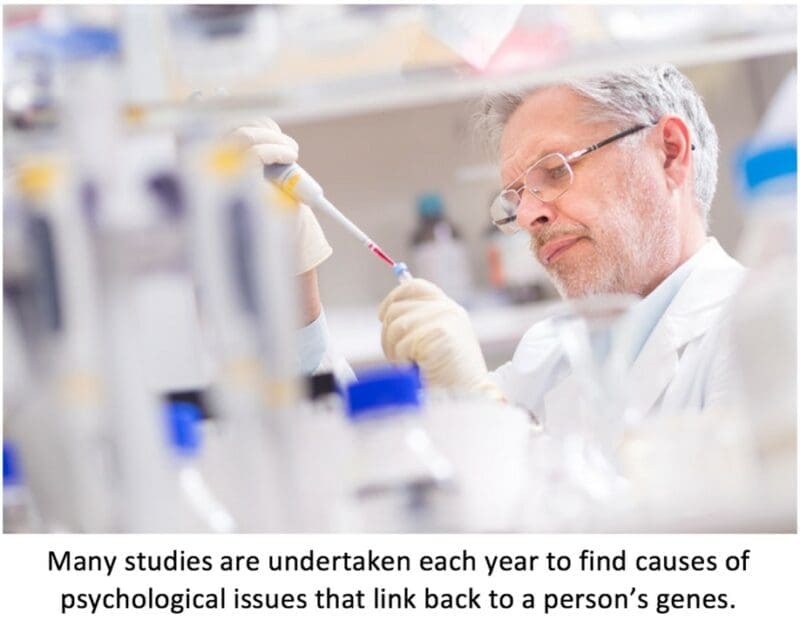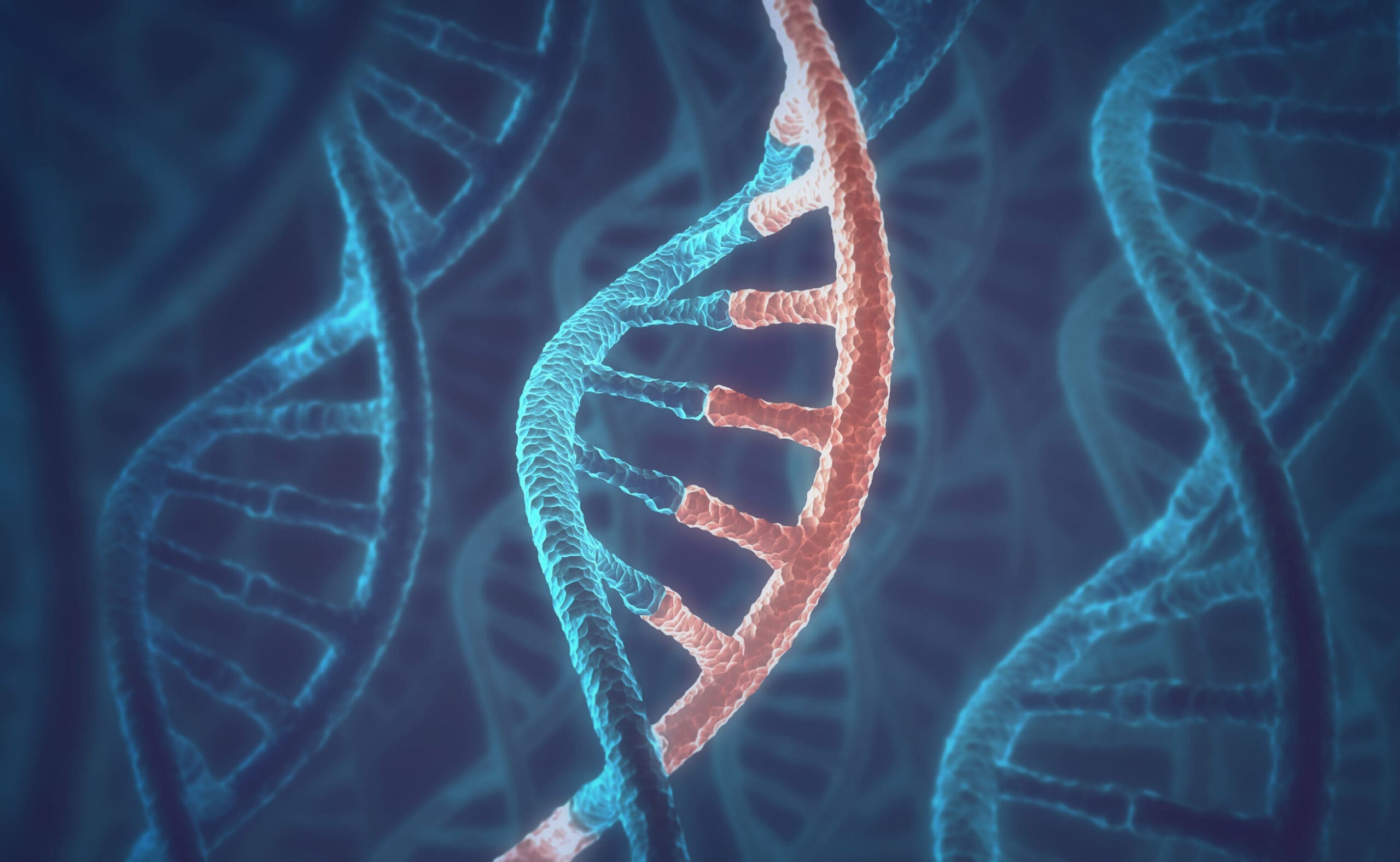In this post
Researchers have faced continual challenges in trying to determine a single, specific cause for many types of mental illness, including both depression and addiction. Genetic influence is one avenue of exploration which researchers believe may have some influence on whether or not a person will develop some types of mental illness.
What are ‘genes’?
A gene is a short section of DNA and humans have up to approximately 24,000 of them in their bodies. A gene carries the information that gives someone their traits, which are features or characteristics that are passed down, or inherited, from their parents.
Genes come in pairs (like chromosomes) and each parent passes on one of their two sets of genes down to their child and these determine things such as hair and skin colour. A child therefore ends up with one set of genes from their maternal side and one set from their paternal side. Except for identical twins, no two people have exactly the same genetic make-up.
For some time researchers have known that genes can cause some diseases and conditions but trying to find a specific gene that might cause a specific mental illness has proven difficult, and genes are just one explanation as to how illnesses such as depression and addiction come about.
How might genes cause depression?
Until recently, researchers have been unable to successfully identify a single ‘depression gene’ as they have for physical illnesses such as cystic fibrosis. It is thought that with any major illness, such as depression, it is very unlikely that one single gene would be responsible for its cause and instead a combination of genes would lead to it.
However, recent research has identified that the gene known as ‘3p25-26’ was prevalent in over 800 families who had some form of history of depression and that this might be a significant link in 40% of cases of depression, with the other 60% being caused by environmental factors. Precisely how this gene ‘causes’ depression is as yet unknown.
Research also consistently appears to show that if a person has a parent or sibling who experiences depression then their chance of developing it increases from 10% up to 30%.
Much of the research that has been carried out in determining if depression is linked to genetics has been done using twin studies. Identical twins are basically clones of each other as they have exactly the same genes, whereas non-identical twins share half of their genes. With this in mind, it would be expected that if an identical twin experienced depression then their twin would experience it as well.

It has been found that only 46% of identical twins both experienced depression and this fell to 20% for non-identical twins. This percentage is known as a concordance rate, which is the probability that a pair of individuals will share a specific trait – in this case, the trait would be depression.
What these concordances rates suggest is that whilst there is clearly a substantial link to genetics, there must be other factors involved as well or the rate, for identical twins, would be 100%. The rates also indicate that just because a person inherits a susceptibility to depression, it does not mean that they will definitely inherit the condition but simply that they are more likely to than someone who does not have a genetic tendency towards it.
How might genes cause addiction?
Just like with depression, researchers are highly unlikely to find one single gene that is completely responsible for addiction because, like many other diseases, addiction is very complex and many factors are likely to contribute to its development. This is made even more complex by the fact that not everyone who experiences addiction will carry the same genes and not everyone who has a gene which is thought to be linked to addiction will exhibit addiction traits.
Again, it is difficult to pinpoint exactly why addiction might be linked to genes although researchers have suggested that ‘faulty’ genes, which transport serotonin around the body, may be linked to addiction as might those which are linked to the chemical anandamide, which is thought to be responsible for levels of anxiety. (Those with higher levels of anxiety are thought to be more prone to mental illness in general, including addiction.)
The risk of experiencing addiction is the same as for depression if a parent or sibling experiences the same, i.e. up to about 30% compared to just 10% if no genetic influence is thought to be present.
A lot of the research into addiction has been carried out on both humans and animals, particularly mice because the way in which their brains’ reward centre works is very similar to that of humans. (Remember that addiction comes about because someone gets a ‘reward’, i.e. a pleasurable feeling, when they indulge in whatever their addiction is.)
When researchers discover a gene that plays a role in addiction in a mouse they can then try to identify the counterpart gene in humans by looking for similar DNA sequences. This is what some of the research into addiction by studying mice has found:
- The A1 allele of the dopamine receptor gene DRD2 is more common in people addicted to alcohol or cocaine
- Mice lacking the serotonin receptor gene Htr1b are more attracted to cocaine and alcohol
- Alcoholism is rare in people with two copies of the ALDH*2 gene variation
However, it is thought that, like with depression, environmental factors are also highly influential in the development of addiction, which might include:
- Childhood trauma or abuse
- Poverty
- Major life events such as divorce or bereavement
- Observing a parent who has an addiction
- Peer influence
Strengths of genes as an explanation for depression and addiction
- Genetics can be scientifically measured and so research findings are accurate and reliable
- Concordance rates show that genetic inheritance does appear to be a significant factor in the development of both depression and addiction
- Research into genetic inheritance is influential in finding new treatments for addiction
- If psychological problems are thought to be caused by genetics, and therefore out of the control of the individual, this may help to reduce the stigma associated with them, as people cannot be ‘blamed’ by society for their condition
Weaknesses of genes as an explanation for depression and addiction
- Concordance rates would be higher if genetics were the single cause of depression and addiction
- The theory is reductionist as it does not take into account any environmental factors, which are clearly influential
- The theory is deterministic, which means that people are ‘pre-determined’ to experience some psychological problems but others argue that free will also plays a part because people can ‘choose’ to let themselves become depressed or addicted
- As twins usually share an identical environment, it may be this which causes them to both experience depression rather than shared genes
- Much of the research into addiction has been carried out on animals, which is not directly generalisable to humans



